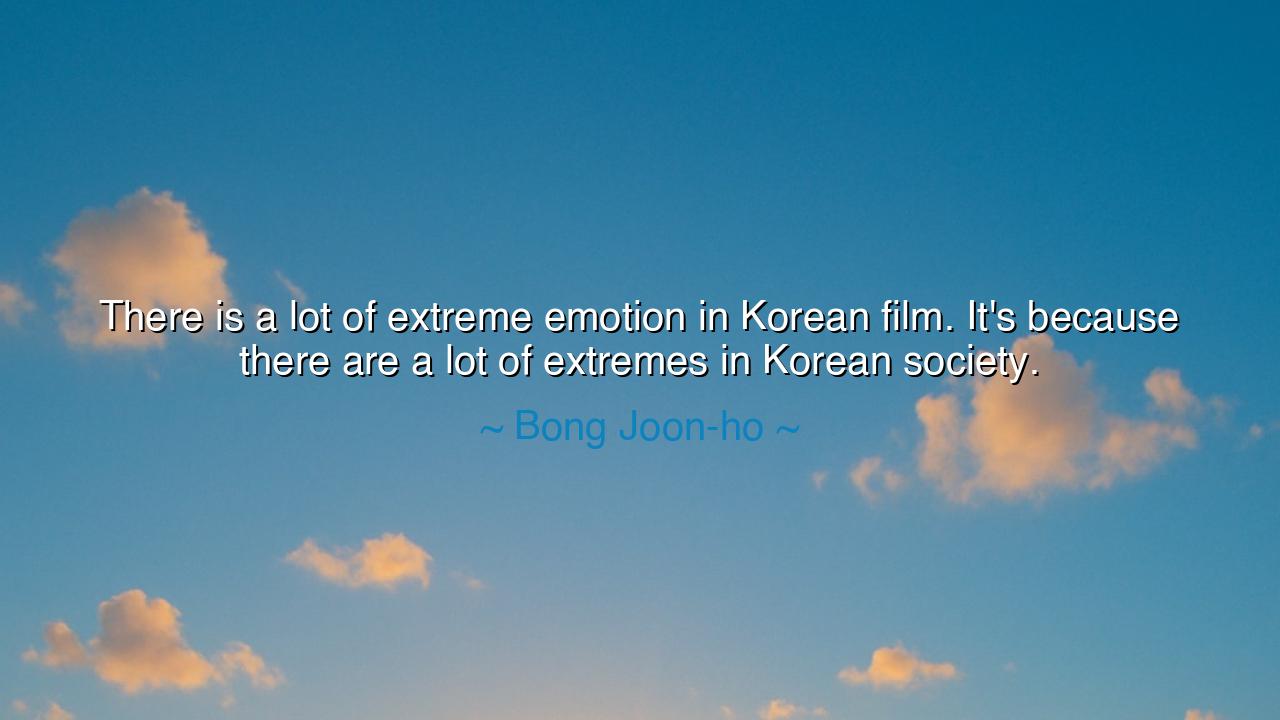
There is a lot of extreme emotion in Korean film. It's because
There is a lot of extreme emotion in Korean film. It's because there are a lot of extremes in Korean society.






"There is a lot of extreme emotion in Korean film. It's because there are a lot of extremes in Korean society." These words spoken by Bong Joon-ho, the renowned filmmaker, illuminate a profound connection between the art of film and the very soul of a society. Korean film, with its intensity, passion, and emotional depth, often portrays the extremes of human experience—ranging from joy to despair, from love to hatred, from compassion to violence. But these portrayals are not arbitrary; they are reflections of the society from which they emerge. Just as the world of Korean cinema expresses raw and unfiltered emotions, the fabric of Korean society itself is woven with contradictions and tensions—between tradition and modernity, between class struggles, and between the ever-present shadow of history and the bright promises of the future.
In the ancient world, the connection between society and emotion was clearly understood. The Greeks, in their tragic plays, sought to convey the extremes of human experience, often through characters faced with insurmountable moral dilemmas, where the stakes were as high as the emotions they evoked. Sophocles, in his great tragedies like Oedipus Rex, revealed a world where fate, pride, and flaw brought characters to the heights of emotional ecstasy and the depths of ruin. In these plays, the extremes were not mere narrative devices, but mirrors reflecting the fragile and volatile nature of human society. Just as Korean cinema portrays extreme emotions, so did the ancient Greeks use extreme situations to reveal the moral, emotional, and social tensions of their time.
Bong Joon-ho's statement reminds us that film, like any art, does not exist in a vacuum but is deeply rooted in the experiences of the people and cultures it represents. Korean society, shaped by its tumultuous history—marked by invasions, war, rapid industrialization, and the painful division of North and South—has cultivated a deep emotional landscape. The modern Korean film industry reflects these extremes in the stories it tells. Films like Parasite, Oldboy, and The Host capture a society that is often on the edge, a society in which the marginalized fight against an unforgiving system, where class divides and social injustices fuel both intense anger and desperation. Korean films do not shy away from depicting the brutality of these emotions, because they are a part of the collective experience.
Look to the example of the Korean War and the division of the nation into two hostile states. This tragic event, which led to immense loss and suffering, still influences the collective psyche of the Korean people. For generations, families were torn apart, and the trauma of war has been passed down through the centuries, creating a deep sense of longing and a need to reconcile the extremes of separation and unity. The emotion that fuels much of Korean art and film is not just a product of personal feeling; it is the result of collective memory—a society trying to make sense of its painful past while striving for a hopeful, yet uncertain, future.
In the same vein, we can consider the dramatic rise of South Korea's economy in the latter half of the 20th century, a transformation that moved the nation from poverty to prosperity. Yet, this economic miracle was not without its human cost. The intense competition, the overwhelming pressure to succeed, and the growing class disparities all contributed to a society that is emotionally charged and frequently torn between hope and resentment. The success of South Korea’s rapid industrialization has created a disconnect between the old ways and the modern hyper-competitive culture, further fueling the extremes of traditional values and modern ambitions. In this volatile emotional atmosphere, the film industry serves as a vessel for public catharsis, reflecting both the pride and pain of a nation that struggles to balance progress with preservation.
The lesson here is not just about Korean film or Korean society, but about the larger truth that extreme emotion in art, whether in film, literature, or theater, is often a mirror to the society from which it emerges. Bong Joon-ho’s insight is a call to recognize that emotion is not just a personal experience but a collective force that shapes the identity of a people. In societies marked by extremes, where people experience both profound suffering and exhilarating joy, art reflects the struggle to make sense of a complex world. It teaches us that emotions are not something to be feared or suppressed but must be understood and expressed as part of the human condition.
As we move through our own lives, let us recognize the power of our emotions and how they shape the society we create. Let us embrace the extremes within ourselves and others, understanding that in their expression, we often find truths that are hard to see in the calmness of equilibrium. Whether through art, film, or our own actions, we must not shy away from the powerful forces of emotion that drive us, for it is in facing the extremes that we can understand the depths of the human experience. Just as Korean films bring raw emotion to the forefront of cultural dialogue, let us channel our emotions to foster a society where honesty, compassion, and understanding can rise to the surface, even from the depths of hardship.






AAdministratorAdministrator
Welcome, honored guests. Please leave a comment, we will respond soon